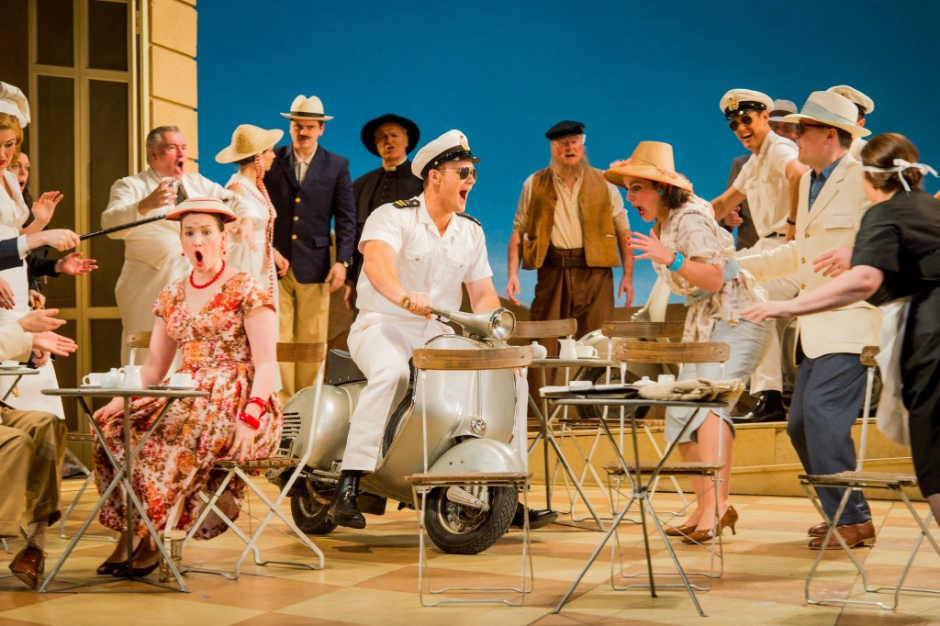L’elisir d’amore, The Lowry, March 17 2016
The collaboration between harried librettist Felice Romani and the celebrated composer Gaetano Donizetti resulted in a trio of operas about three wildly different women. Overall, they seemed to favour melodrama, beginning with a tragic Tudor mistress in Anna Bolena (1830) and finishing on a lusty high with the legend of a Renaissance bitch in Lucrezia Borgia (1833). However, in 1832 the pair scripted their only comedy, pinching the plot from a successful French opera Le Philtre by Eugene Scribe written the previous year. Thus, falling at midpoint in the motley threesome is the airy, flirtatious Adina, the star of their love-potion farce L’elisir d’amore.
Adina can’t be found in the romanticised history books like the other femme fatales, but she can be found reading them. In Opera North’s recent version, we first see her strutting across the terrace of her suave hotel, Hotel Adina, reading aloud from a red bound copy of the legend of Tristan and Isolde. She scoffs at the pair’s everlasting vows and their daft love-potion, treating the tragic story like a jokey comic strip. Her cynical reading upsets the nearby waiter Nemorino who is madly in love with Adina, and who would happily play out the Celtic legend for real. Already the great comic pattern is set: the will-they-wont-they tension between a lovelorn innocent and his flighty boss.
The hotel piazza is suddenly interrupted by the arrival of brash Sergeant Belcore as he cruises into town on a Vespa, fresh back from some military tour, and starts to brag about his peerless success with women. Adina is taken in and very soon a marriage is proposed and accepted. (The speed of marriages in the opera canon rivals any seedy Vegas chapel.) The second shock arrival, by means of a striped hot air balloon, is that of the babbling quack doctor Dulcamara who promises the hotel guests that he can cure anything and everything with his stock of potions – really a stash of cheap liquor. Naturally, Nemorino is depressed by the shotgun engagement but luckily he remembers the Tristan and Isolde myth; the only chance of success, he thinks, is to drink one of the ‘magic’ elixirs from the case of the affable salesman Dulcamara.
The second act follows the aftermath of Nemorino’s credulous purchase: the effect of a cut-price bottle of Bordeaux on a naive non-drinker leads to love’s labour’s sloshed. His drunken confidence now begins to make the previously carefree Adina jealous and she is uneasy throughout her and Belcore’s spirited wedding reception. After another bottle is sunk, the signing of the marriage certificate delayed and the news of Nemorino’s decision to go off to war announced, the pair admit their true feelings and are finally united. End scene.
First debuted at the Leeds Grand Theatre in December 2000, Daniel Slater’s production shows a keen Italophilia. Robert Innes Hopkins’s 1950’s-style stage set appears to be based on scenes from old Alitalia magazine ads. For the first time you realise how the structure of Donizetti’s work closely follows the frenetic order of a carnival season, an Italian speciality. Once a year, Sicily’s Carnival of Acireale displays ghoulish papier-mâché floats. The Carnival of Ivrea in Turin restages the Battle of Oranges between the townsfolk and the oppressive Royal Napoleonic Troops. Best of all is Venice and its surreal army of masked revellers. Similarly, Hotel Adina’s sunlit calm is invaded by two larger than life parade floats: the military man Belcore, played with immense brio by baritone Duncan Rock, and the grand personality of Dulcamara. Richard Burkhard’s delivery is like a rapid-fire cabaret compere, a deceiving patter at its most brilliant during the Act One duet with Nemorino where he makes his easy sale.
At the heart of the carnival, Gabriela Istoc’s Adina prowls round the stage singing through a controlled giggle in the first half, though she beautifully softens her voice later on in order to confess her love. Lastly, Jung Soo Yun proves to be both a faultless comedian and a serious lover. Everything about Nemorino’s underdog position is exaggerated: his first ever drunken stagger, his numerous disappointments along the way. In the passionate arias, he sings with the pathos of someone who has gorged on the literature that Adina couldn’t bring herself to take seriously.
As the curtain closes, the Italian dreamland remains undisturbed. Miraculously, no one sniffs out the booze and the swish hotel set remain convinced that Dulcamara’s potion has worked wonders as they wave off his departing balloon. The satirical float of Donizetti’s carnival, like one of those giant smiling papier-mâché creations, has literally flown away, escaping undetected above a euphoric crowd of well-wishers.
Ashley McGovern

